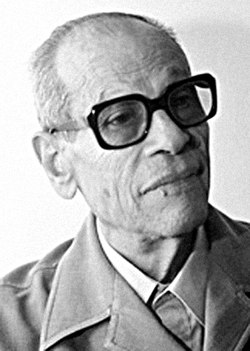Naguib Mahfouz Quote
Writing is for men who can think and feel, not mindless sensation seekers out of nightclubs and bars. But these are bad times. We are condemned to work with upstarts, clowns who no doubt got their training in a circus and then turned to journalism as the appropriate place to display their tricks.
Naguib Mahfouz
Writing is for men who can think and feel, not mindless sensation seekers out of nightclubs and bars. But these are bad times. We are condemned to work with upstarts, clowns who no doubt got their training in a circus and then turned to journalism as the appropriate place to display their tricks.
Tags:
journalism, writing craft
Related Quotes
When people support you when you have done something wrong. It doesnt mean you are right, but it means those people are promoting their hate , bad behavior or living their bad lives through you.
De philosopher DJ Kyos
Tags:
advice, attention, attitude, avenge, bad, bad behaviour, business, character, characteristics, citizen
About Naguib Mahfouz
Naguib Mahfouz Abdelaziz Ibrahim Ahmed Al-Basha (Arabic: نجيب محفوظ عبد العزيز ابراهيم احمد الباشا, IPA: [næˈɡiːb mɑħˈfuːzˤ]; 11 December 1911 – 30 August 2006) was an Egyptian writer who won the 1988 Nobel Prize in Literature. In awarding the prize, the Swedish Academy described him as a writer "who, through works rich in nuance – now clear-sightedly realistic, now evocatively ambiguous – has formed an Arabian narrative art that applies to all mankind". Mahfouz is regarded as one of the first contemporary writers in Arabic literature, along with Taha Hussein, to explore themes of existentialism. He is the only Egyptian to win the Nobel Prize in Literature. He published 35 novels, over 350 short stories, 26 screenplays, hundreds of op-ed columns for Egyptian newspapers, and seven plays over a 70-year career, from the 1930s until 2004. All of his novels are set in Egypt, and always mention the concept of "the lane" as a microcosm of the world. His most famous works include The Cairo Trilogy and Children of Gebelawi. Many of Mahfouz's works have been adapted into Egyptian and international films; Making him one of the most widely adapted Arab authors. While Mahfouz's literature is classified as realist literature, existential themes appear in it.
